A Detailed Analysis of National Deficit Effects on the Economy
VerifiedAdded on 2023/06/07
|7
|1182
|206
Essay
AI Summary
This essay examines the impact of national deficit on a nation's economy, discussing how government expenditures exceeding revenue lead to fiscal deficits financed through loans and borrowings. It highlights potential consequences such as increased debt obligations, inflationary pressures, and slowed economic growth if deficits are poorly managed. However, it also acknowledges that strategic investments in infrastructure can stimulate economic activity and generate revenue. The essay further explores how fiscal deficits can affect employment, trade balances, and overall economic stability, concluding that improper management of fiscal deficits can significantly impede economic progress. Desklib offers a variety of solved assignments and study tools for students.
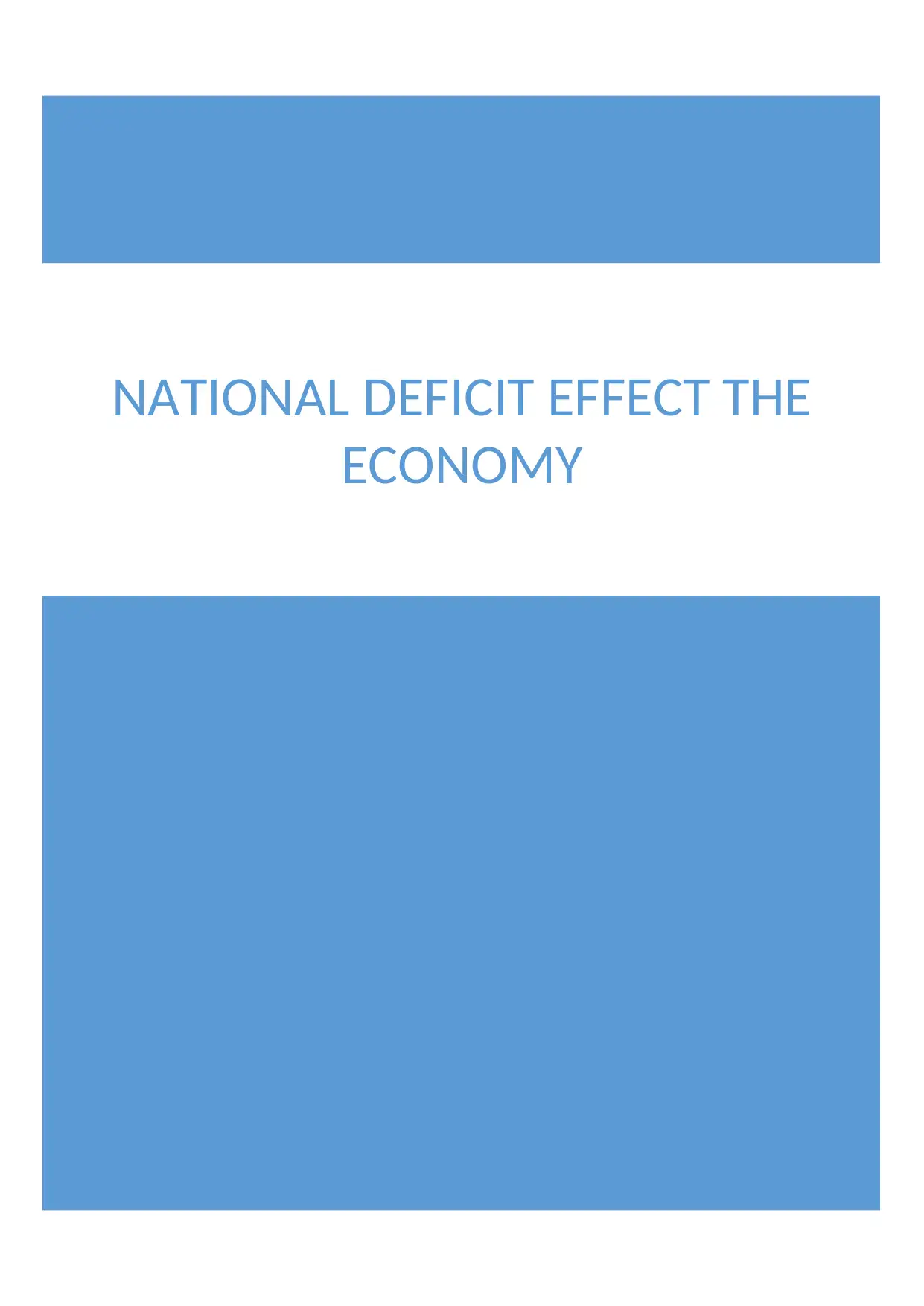
NATIONAL DEFICIT EFFECT THE
ECONOMY
ECONOMY
Paraphrase This Document
Need a fresh take? Get an instant paraphrase of this document with our AI Paraphraser

NATIONAL DEFICIT EFFECT ON THE ECONOMY: 1
Contents
National deficit effect our economy......................................................................................................3
References.............................................................................................................................................5
Contents
National deficit effect our economy......................................................................................................3
References.............................................................................................................................................5

NATIONAL DEFICIT EFFECT ON THE ECONOMY: 2
⊘ This is a preview!⊘
Do you want full access?
Subscribe today to unlock all pages.

Trusted by 1+ million students worldwide
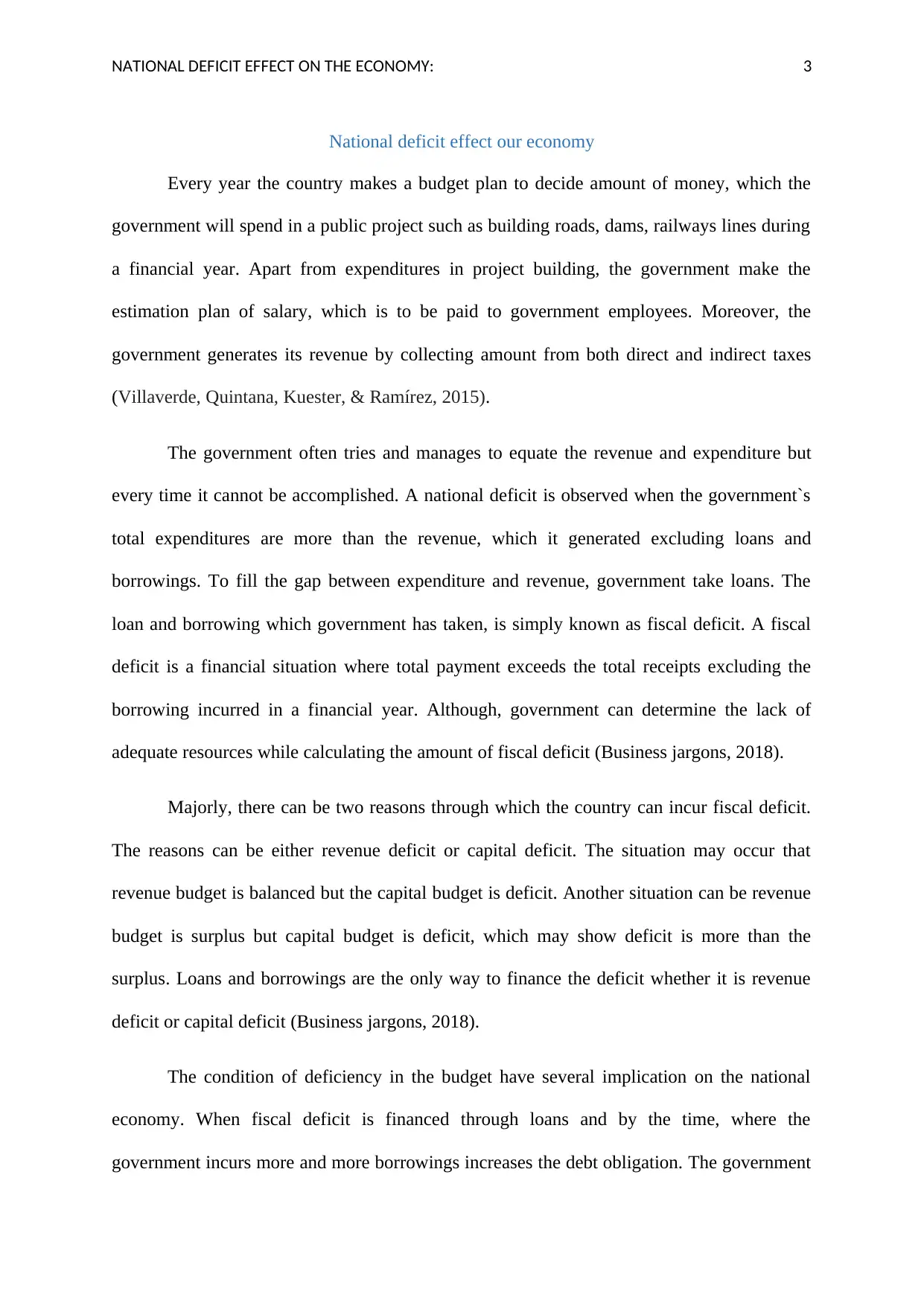
NATIONAL DEFICIT EFFECT ON THE ECONOMY: 3
National deficit effect our economy
Every year the country makes a budget plan to decide amount of money, which the
government will spend in a public project such as building roads, dams, railways lines during
a financial year. Apart from expenditures in project building, the government make the
estimation plan of salary, which is to be paid to government employees. Moreover, the
government generates its revenue by collecting amount from both direct and indirect taxes
(Villaverde, Quintana, Kuester, & Ramírez, 2015).
The government often tries and manages to equate the revenue and expenditure but
every time it cannot be accomplished. A national deficit is observed when the government`s
total expenditures are more than the revenue, which it generated excluding loans and
borrowings. To fill the gap between expenditure and revenue, government take loans. The
loan and borrowing which government has taken, is simply known as fiscal deficit. A fiscal
deficit is a financial situation where total payment exceeds the total receipts excluding the
borrowing incurred in a financial year. Although, government can determine the lack of
adequate resources while calculating the amount of fiscal deficit (Business jargons, 2018).
Majorly, there can be two reasons through which the country can incur fiscal deficit.
The reasons can be either revenue deficit or capital deficit. The situation may occur that
revenue budget is balanced but the capital budget is deficit. Another situation can be revenue
budget is surplus but capital budget is deficit, which may show deficit is more than the
surplus. Loans and borrowings are the only way to finance the deficit whether it is revenue
deficit or capital deficit (Business jargons, 2018).
The condition of deficiency in the budget have several implication on the national
economy. When fiscal deficit is financed through loans and by the time, where the
government incurs more and more borrowings increases the debt obligation. The government
National deficit effect our economy
Every year the country makes a budget plan to decide amount of money, which the
government will spend in a public project such as building roads, dams, railways lines during
a financial year. Apart from expenditures in project building, the government make the
estimation plan of salary, which is to be paid to government employees. Moreover, the
government generates its revenue by collecting amount from both direct and indirect taxes
(Villaverde, Quintana, Kuester, & Ramírez, 2015).
The government often tries and manages to equate the revenue and expenditure but
every time it cannot be accomplished. A national deficit is observed when the government`s
total expenditures are more than the revenue, which it generated excluding loans and
borrowings. To fill the gap between expenditure and revenue, government take loans. The
loan and borrowing which government has taken, is simply known as fiscal deficit. A fiscal
deficit is a financial situation where total payment exceeds the total receipts excluding the
borrowing incurred in a financial year. Although, government can determine the lack of
adequate resources while calculating the amount of fiscal deficit (Business jargons, 2018).
Majorly, there can be two reasons through which the country can incur fiscal deficit.
The reasons can be either revenue deficit or capital deficit. The situation may occur that
revenue budget is balanced but the capital budget is deficit. Another situation can be revenue
budget is surplus but capital budget is deficit, which may show deficit is more than the
surplus. Loans and borrowings are the only way to finance the deficit whether it is revenue
deficit or capital deficit (Business jargons, 2018).
The condition of deficiency in the budget have several implication on the national
economy. When fiscal deficit is financed through loans and by the time, where the
government incurs more and more borrowings increases the debt obligation. The government
Paraphrase This Document
Need a fresh take? Get an instant paraphrase of this document with our AI Paraphraser
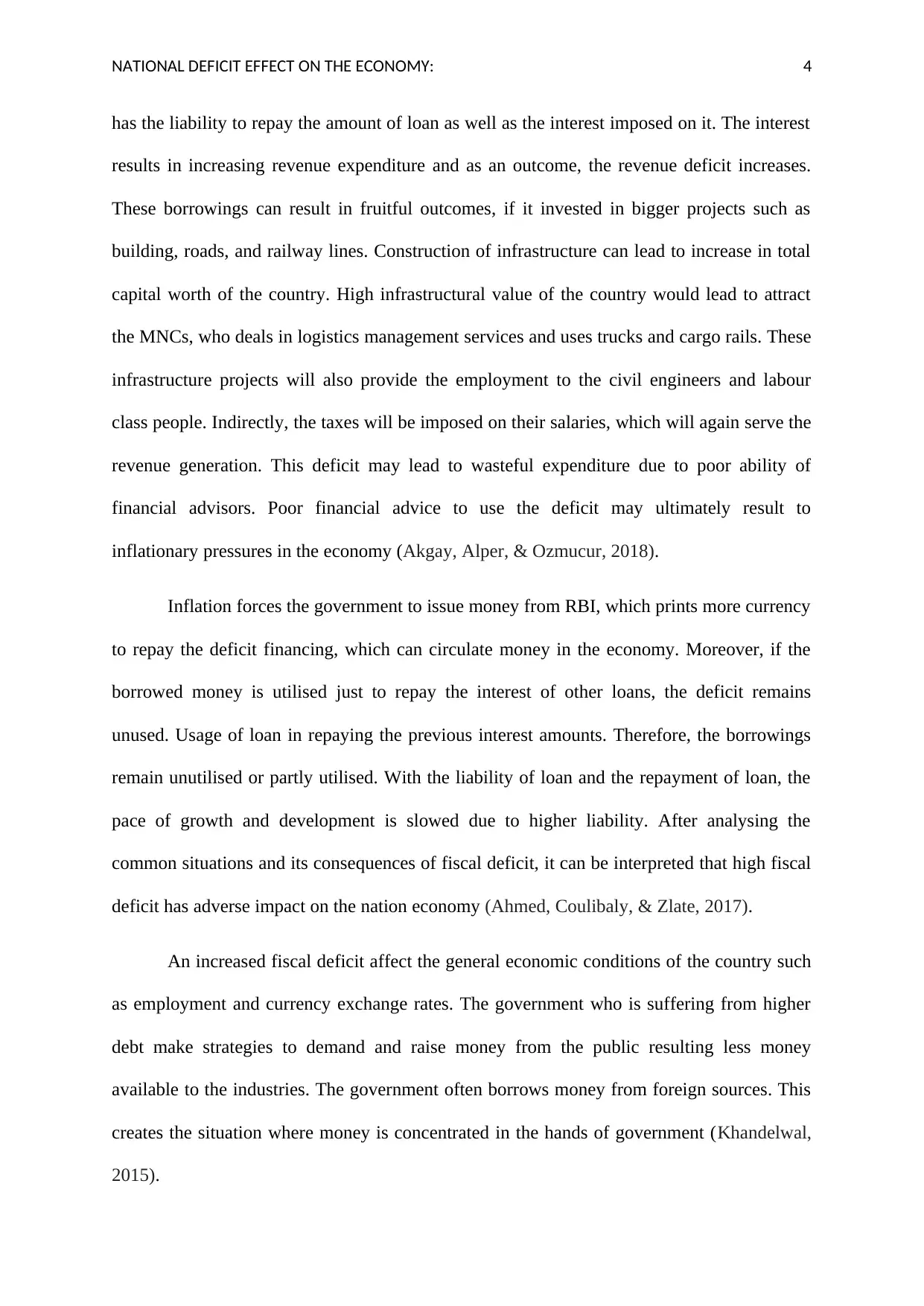
NATIONAL DEFICIT EFFECT ON THE ECONOMY: 4
has the liability to repay the amount of loan as well as the interest imposed on it. The interest
results in increasing revenue expenditure and as an outcome, the revenue deficit increases.
These borrowings can result in fruitful outcomes, if it invested in bigger projects such as
building, roads, and railway lines. Construction of infrastructure can lead to increase in total
capital worth of the country. High infrastructural value of the country would lead to attract
the MNCs, who deals in logistics management services and uses trucks and cargo rails. These
infrastructure projects will also provide the employment to the civil engineers and labour
class people. Indirectly, the taxes will be imposed on their salaries, which will again serve the
revenue generation. This deficit may lead to wasteful expenditure due to poor ability of
financial advisors. Poor financial advice to use the deficit may ultimately result to
inflationary pressures in the economy (Akgay, Alper, & Ozmucur, 2018).
Inflation forces the government to issue money from RBI, which prints more currency
to repay the deficit financing, which can circulate money in the economy. Moreover, if the
borrowed money is utilised just to repay the interest of other loans, the deficit remains
unused. Usage of loan in repaying the previous interest amounts. Therefore, the borrowings
remain unutilised or partly utilised. With the liability of loan and the repayment of loan, the
pace of growth and development is slowed due to higher liability. After analysing the
common situations and its consequences of fiscal deficit, it can be interpreted that high fiscal
deficit has adverse impact on the nation economy (Ahmed, Coulibaly, & Zlate, 2017).
An increased fiscal deficit affect the general economic conditions of the country such
as employment and currency exchange rates. The government who is suffering from higher
debt make strategies to demand and raise money from the public resulting less money
available to the industries. The government often borrows money from foreign sources. This
creates the situation where money is concentrated in the hands of government (Khandelwal,
2015).
has the liability to repay the amount of loan as well as the interest imposed on it. The interest
results in increasing revenue expenditure and as an outcome, the revenue deficit increases.
These borrowings can result in fruitful outcomes, if it invested in bigger projects such as
building, roads, and railway lines. Construction of infrastructure can lead to increase in total
capital worth of the country. High infrastructural value of the country would lead to attract
the MNCs, who deals in logistics management services and uses trucks and cargo rails. These
infrastructure projects will also provide the employment to the civil engineers and labour
class people. Indirectly, the taxes will be imposed on their salaries, which will again serve the
revenue generation. This deficit may lead to wasteful expenditure due to poor ability of
financial advisors. Poor financial advice to use the deficit may ultimately result to
inflationary pressures in the economy (Akgay, Alper, & Ozmucur, 2018).
Inflation forces the government to issue money from RBI, which prints more currency
to repay the deficit financing, which can circulate money in the economy. Moreover, if the
borrowed money is utilised just to repay the interest of other loans, the deficit remains
unused. Usage of loan in repaying the previous interest amounts. Therefore, the borrowings
remain unutilised or partly utilised. With the liability of loan and the repayment of loan, the
pace of growth and development is slowed due to higher liability. After analysing the
common situations and its consequences of fiscal deficit, it can be interpreted that high fiscal
deficit has adverse impact on the nation economy (Ahmed, Coulibaly, & Zlate, 2017).
An increased fiscal deficit affect the general economic conditions of the country such
as employment and currency exchange rates. The government who is suffering from higher
debt make strategies to demand and raise money from the public resulting less money
available to the industries. The government often borrows money from foreign sources. This
creates the situation where money is concentrated in the hands of government (Khandelwal,
2015).
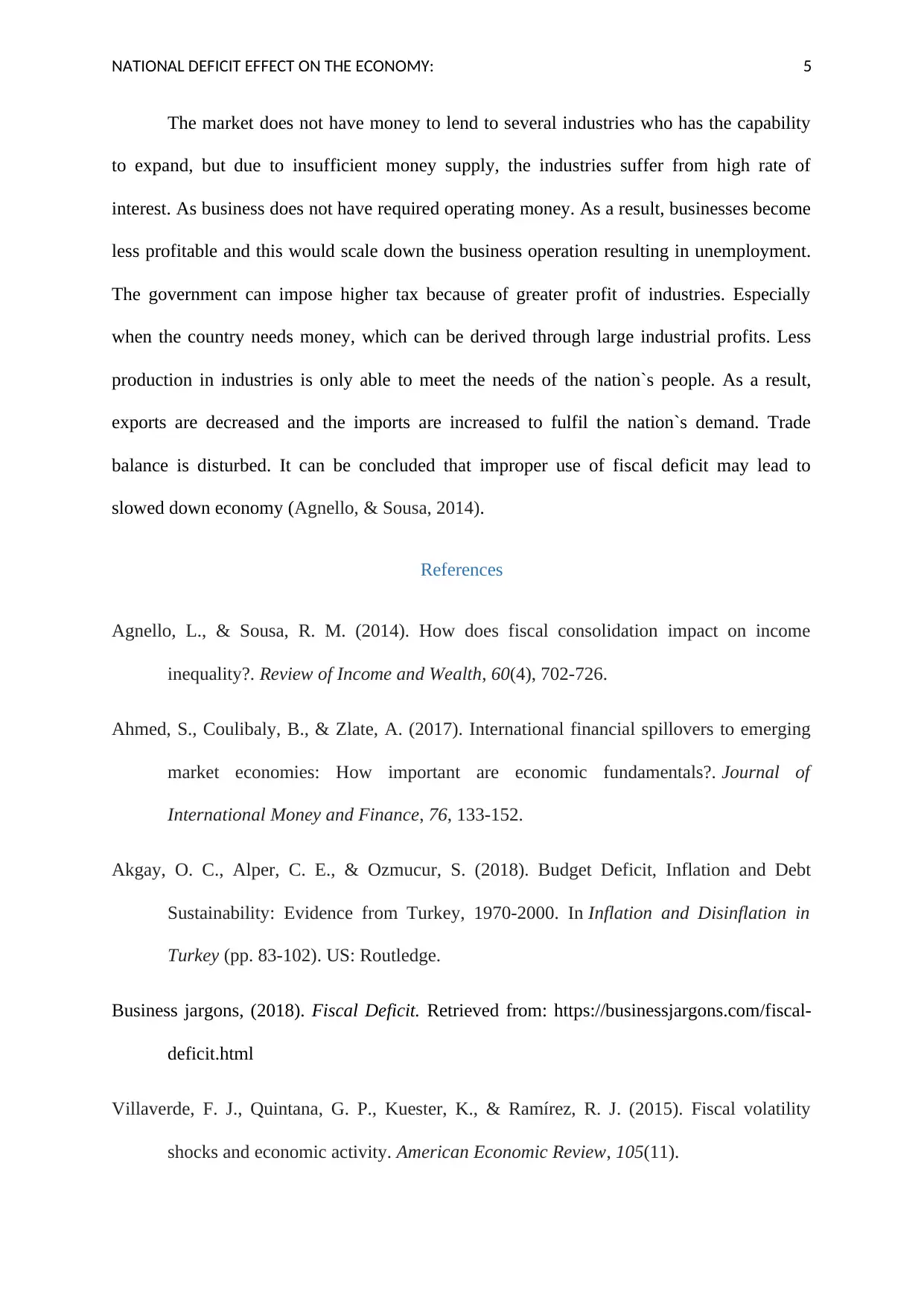
NATIONAL DEFICIT EFFECT ON THE ECONOMY: 5
The market does not have money to lend to several industries who has the capability
to expand, but due to insufficient money supply, the industries suffer from high rate of
interest. As business does not have required operating money. As a result, businesses become
less profitable and this would scale down the business operation resulting in unemployment.
The government can impose higher tax because of greater profit of industries. Especially
when the country needs money, which can be derived through large industrial profits. Less
production in industries is only able to meet the needs of the nation`s people. As a result,
exports are decreased and the imports are increased to fulfil the nation`s demand. Trade
balance is disturbed. It can be concluded that improper use of fiscal deficit may lead to
slowed down economy (Agnello, & Sousa, 2014).
References
Agnello, L., & Sousa, R. M. (2014). How does fiscal consolidation impact on income
inequality?. Review of Income and Wealth, 60(4), 702-726.
Ahmed, S., Coulibaly, B., & Zlate, A. (2017). International financial spillovers to emerging
market economies: How important are economic fundamentals?. Journal of
International Money and Finance, 76, 133-152.
Akgay, O. C., Alper, C. E., & Ozmucur, S. (2018). Budget Deficit, Inflation and Debt
Sustainability: Evidence from Turkey, 1970-2000. In Inflation and Disinflation in
Turkey (pp. 83-102). US: Routledge.
Business jargons, (2018). Fiscal Deficit. Retrieved from: https://businessjargons.com/fiscal-
deficit.html
Villaverde, F. J., Quintana, G. P., Kuester, K., & Ramírez, R. J. (2015). Fiscal volatility
shocks and economic activity. American Economic Review, 105(11).
The market does not have money to lend to several industries who has the capability
to expand, but due to insufficient money supply, the industries suffer from high rate of
interest. As business does not have required operating money. As a result, businesses become
less profitable and this would scale down the business operation resulting in unemployment.
The government can impose higher tax because of greater profit of industries. Especially
when the country needs money, which can be derived through large industrial profits. Less
production in industries is only able to meet the needs of the nation`s people. As a result,
exports are decreased and the imports are increased to fulfil the nation`s demand. Trade
balance is disturbed. It can be concluded that improper use of fiscal deficit may lead to
slowed down economy (Agnello, & Sousa, 2014).
References
Agnello, L., & Sousa, R. M. (2014). How does fiscal consolidation impact on income
inequality?. Review of Income and Wealth, 60(4), 702-726.
Ahmed, S., Coulibaly, B., & Zlate, A. (2017). International financial spillovers to emerging
market economies: How important are economic fundamentals?. Journal of
International Money and Finance, 76, 133-152.
Akgay, O. C., Alper, C. E., & Ozmucur, S. (2018). Budget Deficit, Inflation and Debt
Sustainability: Evidence from Turkey, 1970-2000. In Inflation and Disinflation in
Turkey (pp. 83-102). US: Routledge.
Business jargons, (2018). Fiscal Deficit. Retrieved from: https://businessjargons.com/fiscal-
deficit.html
Villaverde, F. J., Quintana, G. P., Kuester, K., & Ramírez, R. J. (2015). Fiscal volatility
shocks and economic activity. American Economic Review, 105(11).
⊘ This is a preview!⊘
Do you want full access?
Subscribe today to unlock all pages.

Trusted by 1+ million students worldwide
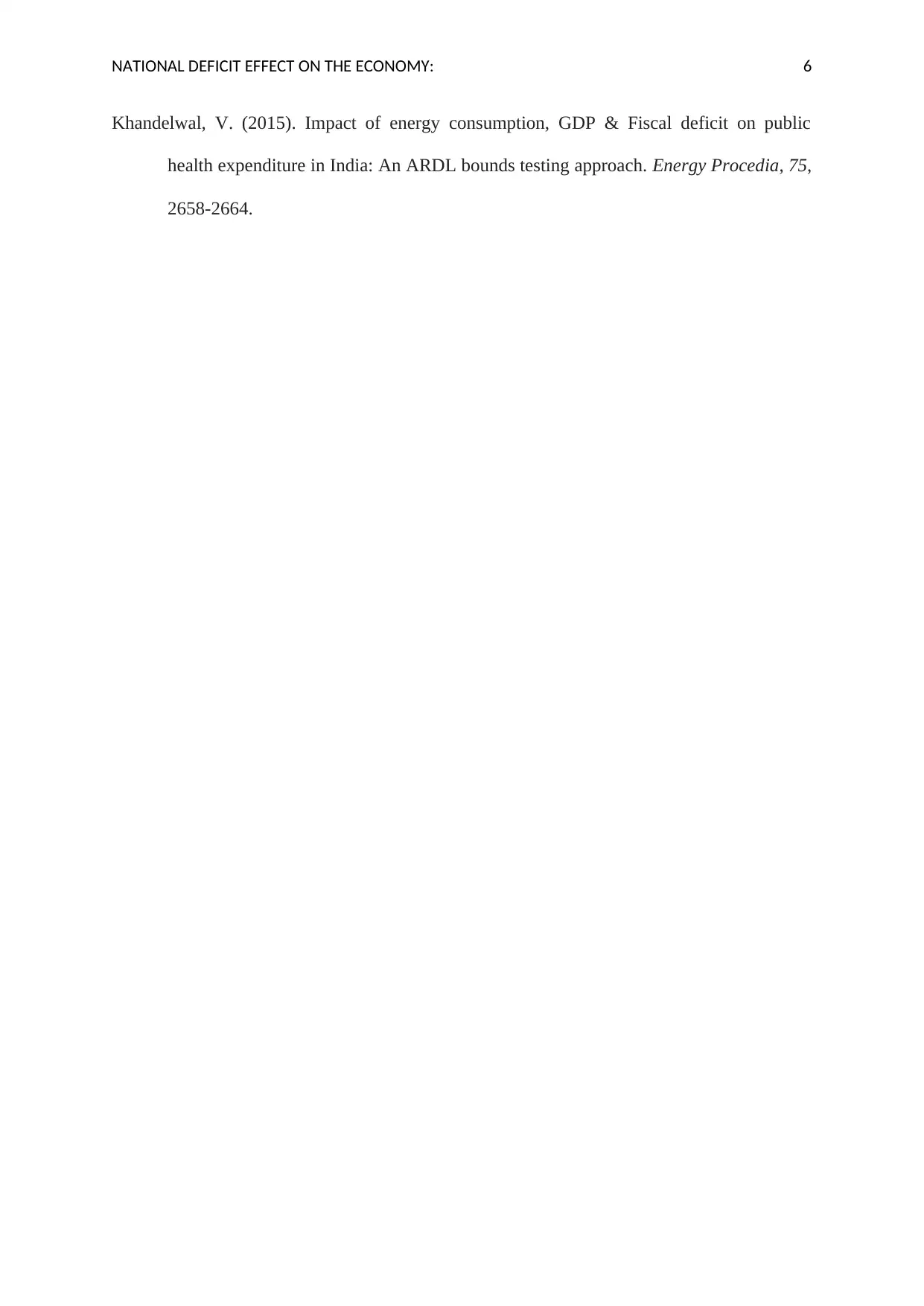
NATIONAL DEFICIT EFFECT ON THE ECONOMY: 6
Khandelwal, V. (2015). Impact of energy consumption, GDP & Fiscal deficit on public
health expenditure in India: An ARDL bounds testing approach. Energy Procedia, 75,
2658-2664.
Khandelwal, V. (2015). Impact of energy consumption, GDP & Fiscal deficit on public
health expenditure in India: An ARDL bounds testing approach. Energy Procedia, 75,
2658-2664.
1 out of 7
Related Documents
Your All-in-One AI-Powered Toolkit for Academic Success.
+13062052269
info@desklib.com
Available 24*7 on WhatsApp / Email
![[object Object]](/_next/static/media/star-bottom.7253800d.svg)
Unlock your academic potential
Copyright © 2020–2026 A2Z Services. All Rights Reserved. Developed and managed by ZUCOL.





